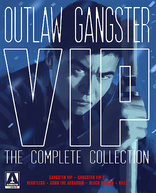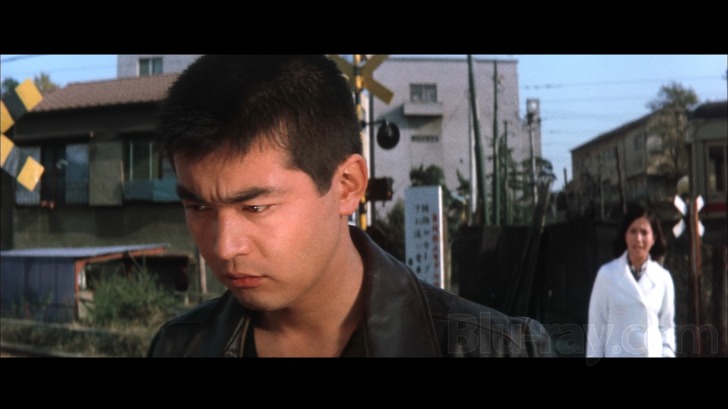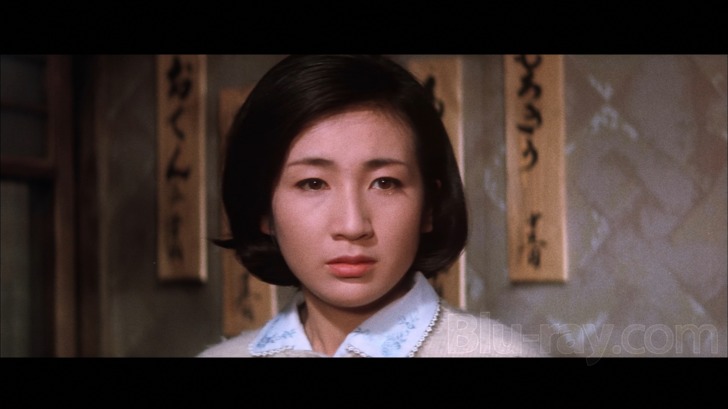Gangster VIP Blu-ray Movie
HomeGangster VIP Blu-ray Movie 
Blu-ray + DVDArrow | 1968 | 93 min | Not rated | No Release Date

Price
Movie rating
6.9 | / 10 |
Blu-ray rating
| Users | 0.0 | |
| Reviewer | 3.5 | |
| Overall | 3.5 |
Overview
Gangster VIP (1968)
A Yakuza fighter becomes disenchanted with his lifestyle after serving three years in prison. Determined to start anew, he attempts to sever ties with his former family, only to realize that he must kill or be killed.
Starring: Tetsuya Watari, Chieko Matsubara, Kyosuke Machida, Kayo Matsuo, Tatsuya FujiDirector: Toshio Masuda (I)
| Foreign | Uncertain |
| Crime | Uncertain |
| Action | Uncertain |
Specifications
Video
Video codec: MPEG-4 AVC
Video resolution: 1080p
Aspect ratio: 2.40:1
Original aspect ratio: 2.35:1
Audio
Japanese: LPCM Mono
Subtitles
English
Discs
50GB Blu-ray Disc
Two-disc set (1 BD, 1 DVD)
DVD copy
Playback
Region A (B, C untested)
Review
Rating summary
| Movie | 3.5 | |
| Video | 3.5 | |
| Audio | 3.5 | |
| Extras | 2.5 | |
| Overall | 3.5 |
Gangster VIP Blu-ray Movie Review
Reviewed by Jeffrey Kauffman April 24, 2016Note: This film is currently available as part of the Outlaw: Gangster VIP Collection.
It’s certainly not a scientific survey by any stretch of the imagination, but when I quizzed a coterie of Japanese film fan friends of mine to
name a
Japanese film studio, absolutely no one came up with Nikkatsu. Toho was quite popular, as was Toie, but Japan’s oldest studio didn’t even
rate one single, solitary mention. Nikkatsu’s rather redolent history goes all the way back to 1912, easily eclipsing Toho’s genesis circa 1932
or Toie’s origination a few years later in 1938. For whatever reason, though, Nikkatsu, despite its status as the “dean” of Japanese movie
studios, doesn’t seem to have the same general notoriety that some of its competitors do. Nikkatsu may be best remembered by at least
some fans for its so-called “pink film” era, a kind of quasi-soft porn (sometimes maybe a little “harder” than merely soft) approach that
helped the studio weather the roiling 1970s era, when big studios, no matter where they might be located, were facing a rapidly changing
set of demographics and an often frustrating and potentially life threatening new set of economic challenges. One of Nikkatsu’s pre-pink era
calling cards was a short-lived but temporarily almost insanely popular franchise which began with 1968’s Gangster VIP, which is also
known by the slightly different title Outlaw: Gangster VIP. As Jasper Sharp mentions on his commentary for the first film of this new
six film set, the kind of ironic thing about this series coming out of Nikkatsu is that Toie had already staked a claim of sorts on the Japanese
gangster film idiom, kind of like Warner Brothers did in the United States back in the 1930s. The Outlaw: Gangster VIP series wasn’t
very long lived, lasting only around two years from 1968-1969, but it’s a really interesting aggregation of films that should appeal to lovers of
yakuza fare or even those who simply like to ferret out largely unseen entries that have been hidden in the various nooks and crannies of
Japanese cultdom for decades.

The fact that all of the Gangster VIP franchise is based on the (evidently at least slightly fictionalized) memoirs of a real life ex-yakuza member named Goro Fujita ostensibly gives the series an authentic feel, though there is still a certain formulaic quality to how things play out across the films. A few tropes become unmissable for those who watch these films in rapid succession, including the often furrowed brow of the (anti-) hero, slightly renamed as Goro Fujikawa (Tetsuya Watari). It’s also not an infrequent occurrence to see a lovely damsel (in distress or otherwise) with a plaintive tear caressing her cheek. There will most likely be some pretty bloody (and graphic) knife fights, and chances are Goro may end his adventures by stumbling toward a rather uncertain future.
Most if not all of those elements are on display throughout Gangster VIP. While there’s not anything truly overly dense in the plotting of this first film, there’s a refreshing depth to some of the story and especially the characterization. Goro’s troubled childhood is detailed in an evocative pre-credits flashback (in black and white), where the deaths of his (prostitute?) mother and little sister start his life out in a traumatized fashion, something that obviously spills into his adult emotional ambience. In a kind of throwback to ideas that occasionally show up in older American gangster epics, two childhood friends later become adult nemeses, though in this film it’s not the case where one is a criminal and the other a lawman—both are yakuza, simply aligned with different gangs. Here, the two characters with a long history are Goro and his erstwhile reform school buddy Sugiyama (Kyôsuke Machida). The overall arc of this film (something that's reflected in several of the sequels) finds Goro attempting to live by a more precise set of morals than many of his yakuza kin, if not go outright "straight and narrow," something that leads to considerable "professional" conflict.
Goro’s personal life is in no better shape, unfortunately. His longtime love Saeko (Yasuko Sanjo) has left him during his stint in stir, and a new potential girlfriend named Yukiko (Chieko Matsubara) doesn’t seem to be his type, plus may be putting herself in danger by attaching herself to him. Somewhat interestingly, a perhaps slightly unexpected alliance forms between former adversaries, leading to a chaotic showdown between warring elements.
Gangster VIP may not be completely convincing as a no holds barred, inarguably realistic, portrayal of gang life in a post-war Japan, but it creates an undeniable mood and has some rather interesting things to say about honor codes, those in a “cult” like group, and even the role of women in “contemporary” Japanese society (an aspect several of the subsequent films also address). Performances are excellent and the fight scenes are generally well staged as well. It may seem a bit odd that a film as apparently (relatively) “lightweight” as Gangster VIP should have evidently become such a rage in Japan at the time of its release, but the film combines a number of compelling (and at times downright odd) genre tropes (not necessarily limited to the gangster idiom) that make it a uniquely satisfying viewing experience.
Note: Our scoring system can be a little frustrating at times, especially when dealing with a franchise like this. I'm rating the two first films at 3.5 overall, though I would give this a 3.75 and the second a 3.25 if I were able to.
Gangster VIP Blu-ray Movie, Video Quality 

Gangster VIP is presented on Blu-ray courtesy of Arrow Films with an AVC encoded 1080p transfer in 2.40:1. All six films in the Outlaw
Gangster VIP franchise share some common characteristics, and so I will be offering some general assessments that pertain to the series
as a whole before moving on to more specific comments about this particular film. Arrow's brief comments on the provenance of the elements
utilized for these transfers mentions only that "The Outlaw Gangster VIP series was transferred from original preservation film elements
by Nikkatsu Studios in Japan. All six films were delivered to Arrow Films as remastered files." This unfortunately doesn't really provide a lot of
information, and it's my assumption that at least some of these may have been transferred from secondary sources like prints rather than IPs or
negatives. Several of the films have recurrent brightness and contrast fluctuations which are quite noticeable and create a kind of slow motion
quasi-flicker, with clear gradations in tones especially visible in darker moments. While elements show various signs of wear and tear, and
feature slight fading which tends to skew flesh tones toward the brown side of things, palettes are overall quite convincing and robust, especially
when it comes to aspects like the bright red blood that flows so ubiquitously in each of the entries.
Gangster VIP's opening moments are a little rough looking, and its Nikkatsu banner is noticeably more age damaged than several others
in the series. Detail is variable here, tending to pop best in close-ups, as should be expected. The palette is just slightly pallid looking at times,
perhaps exacerbated by a slightly over bright appearance. Still, colors pop quite well when bright primaries are in play. Grain resolves naturally
and affords the viewing experience a nicely organic quality. Contrast is generally stronger than in some of the other films in the set, and there
are not the prevalent brightness and contrast fluctuations that occur in some other films.
Gangster VIP Blu-ray Movie, Audio Quality 

All six films in this set feature uncompressed LPCM Mono tracks in the original Japanese. None of the films is going to set audiophiles' hearts on fire, but with occasional exceptions (Black Dagger being the most noticeable one), there are few real problems with distortion or other age related issues. The films' dialogue and effects are typically rendered with decent force and fidelity, and the fun scores also sound decent, if narrow. Black Dagger receives the lowest audio score of any film in this set due to some distortion that's evident, most noticeably when music is playing.
Gangster VIP Blu-ray Movie, Special Features and Extras 

- Audio Commentary is by Jasper Sharp.
- Trailer (1080p; 3:09)
- Gallery (1080p)
Gangster VIP Blu-ray Movie, Overall Score and Recommendation 

Gangster VIP probably seemed a good deal "grittier" back in 1968 than it does today, but it still is a slam bang introduction to a fascinating character, and it's easy to see why Goro became such a popular figure in Japanese filmdom, albeit for a relatively short span of time. This first entry sets up a number of tropes which the sequels follow to a tee, for better or worse. Technical merits have occasional problems, but are generally very good. Recommended.
Similar titles
Similar titles you might also like
(Still not reliable for this title)

Black Dagger
1968

Kill!
1969

Gangster VIP 2
1968

Goro the Assassin
1968

Heartless
1968

Massacre Gun
Minagoroshi no kenjû
1967

Hiroshima Death Match
Battles Without Honor and Humanity - Deadly Fight in Hiroshima
1973

Doberman Cop
ドーベルマン刑事 / Doberuman deka
1977

Eight Hours of Terror
8時間の恐怖 / Hachijikan no kyôfu
1957

Detective Bureau 2-3: Go to Hell, Bastards!
探偵事務所23 くたばれ悪党ども / Kutabare akutô-domo - Tantei jimusho 23
1963

The Man with a Shotgun
散弾銃の男 / Sandanju no otoko
1961

Ley Lines
1999

First Love
初恋 / Hatsukoi
2019

Stray Cat Rock: Delinquent Girl Boss
1970

Youth of the Beast
野獣の青春 / Yajû no seishun
1963

Dead or Alive 2
2000

Battles Without Honor and Humanity
1973

Proxy War
Battles Without Honor and Humanity
1973

Dead or Alive
1999

The Man from Nowhere 4K
아저씨
2010